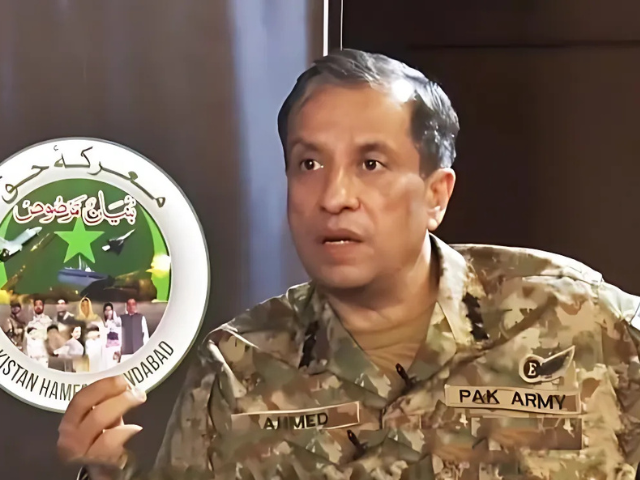Pakistan Warns India Against Weaponising Water Amid Rising Tensions










2025-05-19T02:16:06Z

In a strong warning to India, the Director General of Inter-Services Public Relations (ISPR), Lt Gen Ahmed Sharif Chaudhry, has expressed grave concerns about India's threat to stop the flow of water from the Indus River. He emphasized that any attempt by New Delhi to weaponize water could have dire consequences, affecting generations to come, as tensions between the two countries continue to escalate.
In a recent interview with Arab News, Lt Gen Chaudhry articulated Pakistan’s staunch position regarding this critical issue, stating, "It is some madman who can think that he can stop water of 240 million plus people of this country." He further warned, "I hope that time doesn't come, but it will be such actions that the world will see and the consequences of that we will fight for years and decades to come. Nobody dare stop water of Pakistan." This statement reflects the heightened anxieties in the region amid India's recent unilateral suspension of the decades-long Indus Waters Treaty, a pivotal agreement that governs the sharing of water from the Indus River system.
The backdrop to these escalating tensions is a complex history of conflict and mistrust between Pakistan and India, particularly regarding water resources and territorial disputes in Kashmir. Following a deadly attack on tourists in Indian Illegally Occupied Jammu and Kashmir (IIOJK), which India attributed to Pakistan—a claim that Islamabad has vehemently denied—hostilities have surged once again. In early May, India launched cross-border strikes targeting what it claimed were militant positions. Pakistan responded decisively, striking back against 26 Indian military sites before a ceasefire was brokered by the United States on May 10.
Despite the ceasefire, the situation remains precarious. Recently, Indian Prime Minister Narendra Modi announced plans to cut off the flow of Indus waters into Pakistan, a declaration that has sparked fears of further military escalation. For Pakistan, such an act would be regarded as tantamount to an act of war.
Lt Gen Chaudhry reassured that Pakistan remains committed to peace, yet he emphasized the need for vigilance. "Pakistan armed forces are a professional armed forces and we adhere to the commitments that we make," he said. He stressed that while both nations have accused each other of ceasefire violations, Pakistan's military response is always calculated and directed specifically at military posts responsible for such violations, avoiding civilian targets.
Moreover, in the course of recent military engagements, Lt Gen Chaudhry revealed that India had lost six aircraft, including advanced models like the French-made Rafales and Mirage 2000, during the four-day conflict. This number was recently confirmed by Prime Minister Shehbaz Sharif, who noted the additional losses suffered by India in its military operations.
Looking towards the future, Lt Gen Chaudhry pointed out that the persistent risk of renewed conflict hinges on the unresolved issue of Kashmir. He stated, "Their policy on Kashmir is not working. Till the time Indians don’t sit and talk about Kashmir, then as two countries we sit, and we find a solution to it, the conflict potential is there." This underscores a critical aspect of the ongoing tensions; without dialogue, the potential for conflict remains ever-present.
In further clarifying Pakistan's stance, the DG ISPR asserted that the country is not a belligerent actor but rather one that values peace above all else. "We are not a violent nation, we are a serious nation. Our first priority is peace," he stated in an interview with RT Arabic, as reported by PTV News. He acknowledged that great powers, including the United States, recognize the genuine spirit of the Pakistani people in their quest for stability and peace.
Discussing the ceasefire negotiations that followed Pakistan's retaliatory operations, Lt Gen Chaudhry revealed that the initial call for a truce actually came from the Indian side. He recounted how the spokesperson for India’s defense ministry had sought a ceasefire, which Pakistan welcomed as a step towards de-escalation.
Regarding the conflict's origins, the DG ISPR insisted that a comprehensive understanding of the Pakistan-India tensions requires delving into the broader context. He criticized India's quickness to blame Pakistan without substantial evidence, particularly in light of the recent Pahalgam incident.
Moreover, Lt Gen Chaudhry reaffirmed Pakistan's commitment to territorial integrity and national sovereignty, underscoring the military's role in protecting these principles. He also reiterated longstanding concerns about India's alleged support for terrorism within Pakistan, specifically naming groups like the Tehreek-e-Taliban Pakistan (TTP) as examples of external destabilizing forces.
 Maria Kostova
Maria Kostova
Source of the news: The Express Tribune